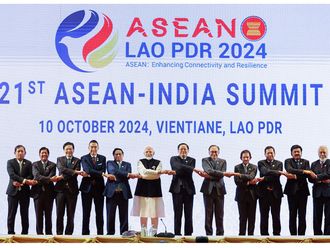
There are many men, heads of households, who choose to move to another country along with their families in search of better living conditions. They have the comfort and security of being surrounded by their loved ones in unfamiliar territory as they begin to settle in. But there are many more other men who cannot bring their families along with them simply because their jobs or employers will not allow their families to accompany them based on their work status.
It is indeed an act of selfless proportions when such a man in some distant and foreign land prepares for his journey to Saudi Arabia or anywhere in the GCC for that matter, packs up his bags and bids his family farewell. His goal while in this country is to provide for an enhanced life for his beloved family, and he quickly involves himself towards that purpose.
Tugging on his emotional strings will remain the fond remembrance of the last goodbyes from the loved members of his family including his small children, who, in his absence, will undoubtedly grow much faster than the memories he carries with him.
After his arrival and integration into this country, he will punctually maintain contacts with his family, either via the telephone or through letters and pictures, eagerly drinking up on the tid-bits and antics of his family, and specifically his young and rumbunctious children. He grasps onto his parenthood, discussing with his wife the various avenues of development for his offspring.
Dutifully sending them money on a monthly basis, and buying the little ones toys and games during his weekend forays to the shopping centres, he gains a measure of satisfaction imagining how their eyes would light up when receiving their gifts. All this he does at a great personal sacrifice.
Social aberration
Besides bearing the pain of separation from his growing family, the man has to endure alien living conditions and harsh work conditions, and he does all that quietly for a purpose. He will eventually finish up and return to his loved ones.
On the other side of the coin, there exists a social aberration here among the fringes of affluent Saudi families. Aisha, a Saudi mother of two young children was recently relating to me a chronicle of her frustrations and disappointment with parenthood. It is an altogether familiar tale of a Saudi businessman or technocrat who has embarked on a blind quest for the all-powerful buck, foregoing along the way his duties and responsibilities to his family. In Aisha's case, it has generated a certain irony in that while her husband has been busy and preoccupied with his ambitions, he has forgotten that he has a family to look after.
His children are growing up without the presence of a father who is usually not around to monitor them. One wonders what goes through the mind of a seven-year-old boy who is compelled to take the family driver to represent him during his father's meetings in school. The father is simply too busy to be bothered. What would be the long-term social impact of such neglect, I question.
Or the rebellion of these young boys in school or at home, as in Aisha's case where the teacher had to contact the father's office manager to advise him that the young boy has recently begun an attitude of total stubbornness and reluctance to pay attention to his work. Where was the father, I wonder.
Some of these fathers become parents purely through a physiological incident without a preconceived plan or notion of the responsibilities that go along with such a role. They travel far and wide, astutely germinating their growing business agendas, but neglecting what is right there beneath their noses.
When the demands of the children reach larger proportions, it is much easier to pack them off to some distant boarding schools than to play an active part in their development. These children often become strangers to their father, perceiving him as an alien Santa Claus whose short bursts of excessive indulgence through gifts and toys is an undisguised attempt to win them over through benevolence and generosity and to pacify the feelings of guilt within himself.
There are many stories similar to Aisha's. In the end, there is regrettable loss. Not just to the family but to the gentleness within society as well. It is in the next coming generation that the foreboding manifestations of today's quality of parenthood will become apparent.
That is, unless these fathers wake up and take notice.
Tariq A. Al Maeena is a Saudi socio-political commentator. He lives in Jeddah, Saudi Arabia.








